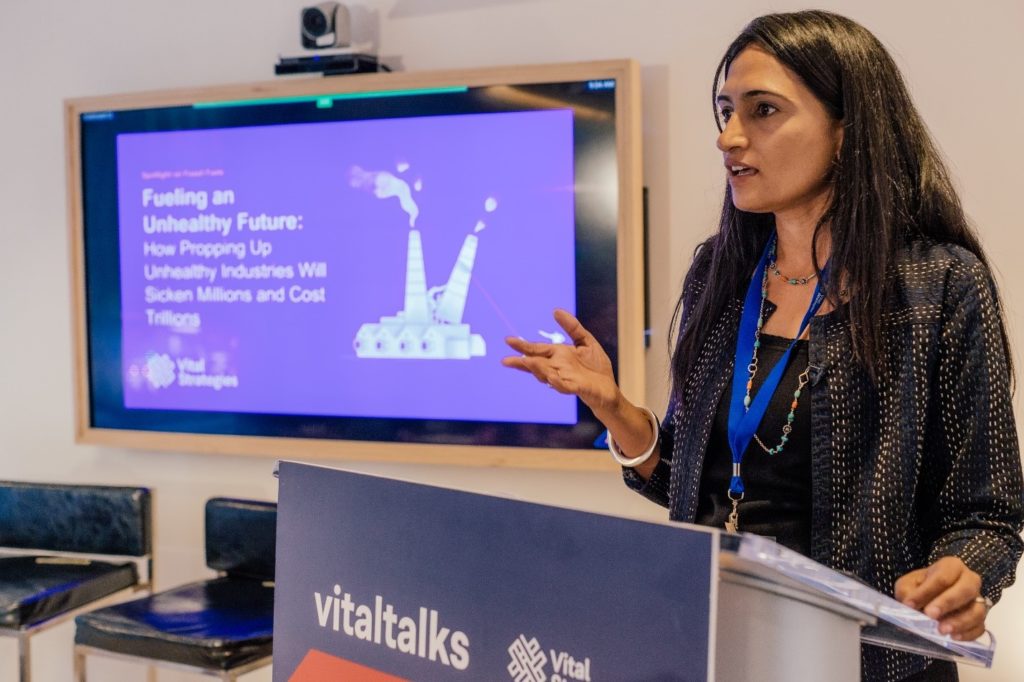
During a week of pivotal United Nations General Assembly summits, including the High-Level Meeting on Universal Health Coverage, a Climate Summit, and a High-Level Dialogue on Financing for Development, Vital Strategies hosted several high-profile speakers at its Vital Talks event to discuss how governments can redirect funds away from subsidizing unhealthy industries in favor of policies that put available finances toward preventing noncommunicable diseases (NCDs).
We sat down with Nandita Murukutla, Vice President of Global Policy and Research at Vital Strategies to get her takeaways from the event and learn about the forthcoming report, “Fueling an Unhealthy Future,” that places a spotlight on the fossil fuels industry. This report illustrates the inconsistency in government policies towards industries that produce health harmful products such as tobacco, alcohol and fossil fuels.
1. What do you mean by health harmful industries?
The health challenges we currently face are from noncommunicable diseases (NCDs), which are responsible for two-thirds of all global deaths. Most of these preventable deaths are caused by consumption of or exposure to certain products that harm human health. These includes tobacco, alcohol, and fossil fuels that cause air pollution. It is projected that premature deaths due to fossil fuels will cost governments $2.7 trillion (3.3% of the real global GDP). The focus of our report is to show how incentivizing the growth of these industries is against public health.
2. What are health harmful incentives? Why do they matter?
In short, we define health harmful incentives as economic stimulus given to industries, which ultimately produce products that when consumed harm public health. Governments do so through a variety of economic incentives, including subsidies, tax breaks and other forms that allow the industries to grow in the name of “development.” Not only do these incentives promote these industries, more egregiously, they convey the government’s sanction of the growth of these products and industries. This is antithetical to the work of government, health ministries in particular, that are mandated to promote health.
3. What are some of the key findings from this new report?
In this report, we find that in many countries there is a visible gap in the investment in health compared to what is spent on subsidizing fossil fuels, which amounts to about $3 trillion globally. In many countries including India, China and Russia, health costs attributable to fossil fuels are more than five times each country’s entire health expenditure individually. That’s the most startling finding and what we really want to highlight in the report.
4. What is the goal or call to action of the report?
There is a global shortfall of public financing for NCDs. For instance, only about 2% of overseas development aid is provided to NCDs and, yet, governments continue to incentivize the very industries that contribute towards the high toll and costs from NCDs. The current way of functioning is not sustainable. Efforts within health ministries must be supported across all branches of government. Fiscal policy must align with health policy, and in fact, it must be used to promote health. The purpose of this report is to highlight the current incoherence in public policy and to call for increased transparency in practice across government departments. Ultimately, this report calls for the phasing out of incentives to health harmful industries and investment in public health instead.
5. Why is the United Nations General Assembly a critical moment to urge governments and countries to act?
There has been growing global recognition of the shortfall in investment in health and development. The last UN General Assembly High-Level Meeting had intense discussions around the need to ensure health is a fundamental pillar of development by recognizing the gaps in health expenditure and the intense burden that would result otherwise.
This year’s High-Level Dialogue on Financing for Development provides an opportunity for policymakers to bring attention to the current incentives to unhealthy industries and the incoherence in the system. This report highlights how funds would be much better spent, with higher return on investment, by investing in primary prevention.
Visit vitalstrategies.org/vitaltalks to watch the full recording of the Sept. 26 Vital Talks event which featured Dr. Tedros Adhanom Ghebreyesus, World Health Organization Director-General; Her Royal Highness Princess Dina Mired of Jordan, President of the Union for International Cancer Control 2018- 2020; Dr. Kelly Henning, Lead of Global Health Programs, Bloomberg Philanthropies; José Luis Castro, President and CEO, Vital Strategies; Douglas Webb, Team Lead, HIV, Health and Development Practice, United Nations Development Programme; Nina Renshaw, Director, Policy and Advocacy, NCD Alliance;
Dr. Nandita Murukutla is a social behavioral scientist, with a background in behavioral economics. At Vital Strategies, Dr. Murukutla leads a team that produces social research, policy analysis, monitoring and evaluation to guide policy-maker and program-manager decisions in over 20 countries in a range of areas that include tobacco control, obesity prevention, food policy, road safety. Dr. Murukutla has additional oversight of the Policy, Advocacy and Communication programs in India.
Follow Nandita on Twitter: @nita_murukutla